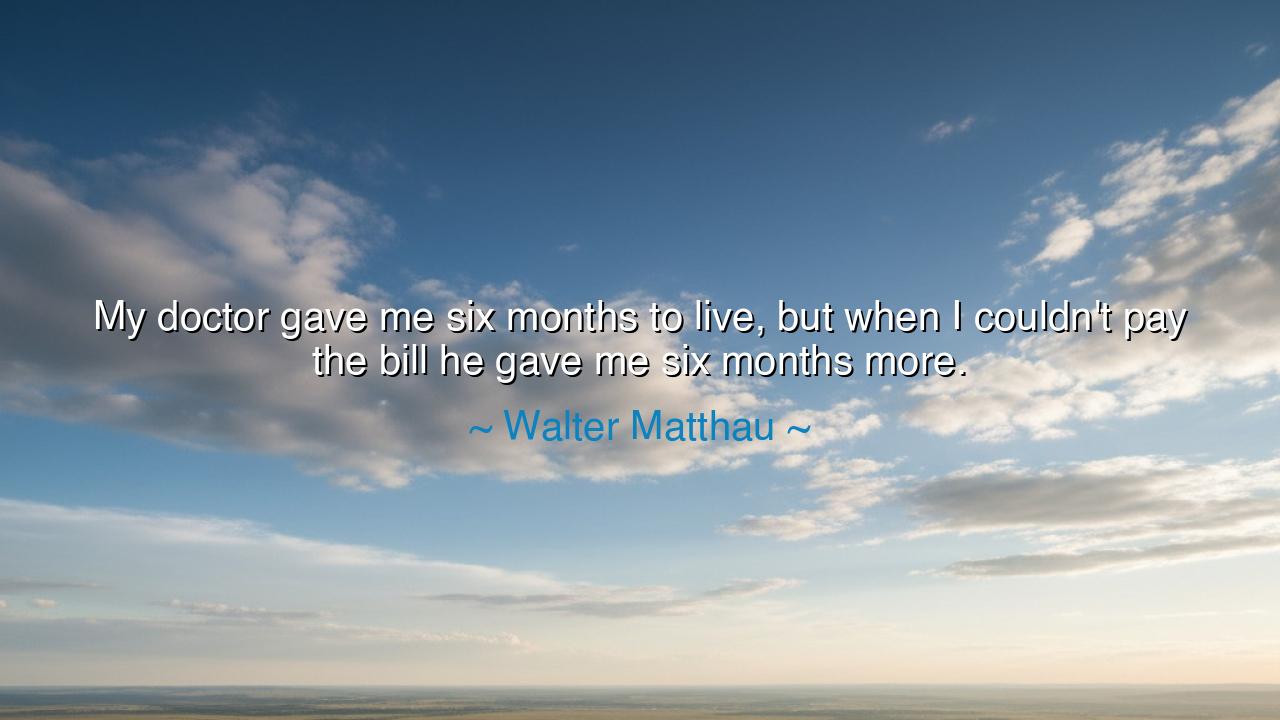
My doctor gave me six months to live, but when I couldn't pay the
My doctor gave me six months to live, but when I couldn't pay the bill he gave me six months more.






In the heart of every human life, there lies an undeniable truth: the world often operates in unexpected ways, governed not by logic alone but by the whims of circumstance and the fragile bonds that tie us to one another. Walter Matthau’s words, "My doctor gave me six months to live, but when I couldn't pay the bill he gave me six months more," strike at the very heart of this truth. With a wry sense of humor, Matthau captures a deeply painful reality—the merciless intersection of life, death, and economics. His words serve as both a dark comedy and a biting commentary on the way humanity often treats its most vulnerable members.
The ancients, like Socrates and Plato, believed that the soul and the body were bound in a delicate dance, but that the essence of life should not be reduced to material concerns. Socrates, when faced with his own death, chose to die with dignity rather than escape the inevitable, as a stand for virtue and truth. In contrast, Matthau’s statement brings us face to face with the cruelty that sometimes comes when human life is viewed through the lens of monetary value, reminding us that even our most intimate encounters—such as those between a doctor and patient—are often distorted by financial obligations.
What Matthau’s quote highlights is the uncomfortable reality that life itself can sometimes feel as if it is for sale. When health and life expectancy are placed on a scale that measures them by the ability to pay, we are forced to reckon with a society where the most essential human needs are often weighed against wealth. The ancient Egyptians, for example, recognized the power of health and death, understanding the eternal journey of the soul. But even they were not free from the influences of their material world. It is well documented that Pharaohs surrounded themselves with wealth and luxuries in the hope of securing their immortality. Similarly, in Matthau’s world, the fragility of life becomes overshadowed by the sheer pragmatism of paying one’s dues—literally and figuratively.
The irony in Matthau’s words cannot be ignored. In one sense, the doctor’s willingness to extend the patient’s life beyond what was medically necessary speaks to a human kindness, an act of mercy, albeit motivated by a financial transaction. It reflects an unsettling truth about the modern world: our health, like so many other aspects of our lives, is governed not by the inherent value of our existence but by the money in our pockets. It is a real-life paradox that the most important aspects of life—life itself—are often subordinated to the harsh realities of economic power.
Consider the example of Louis Pasteur, the great scientist who transformed the world of medicine with his discoveries in microbiology. Pasteur’s work was not just a product of scientific curiosity, but also of the deep moral commitment to human health. His discovery of the germ theory revolutionized medicine, saving countless lives and bringing forth a new understanding of how to combat disease. Pasteur’s life was dedicated to the idea that human health transcended financial considerations. In contrast, Matthau’s quote draws attention to the dehumanizing aspect of a system that places a price tag on the right to live, forcing us to confront the sometimes tragic reality that human well-being is often a commodity.
The lesson that we must draw from Matthau’s words is not only about the injustice of a world where money dictates the quality of life, but about the need for a rebalancing of our values. In this age, when healthcare systems across the world are often defined by their costs, we must question whether a true society can claim to be just when the basic rights of life, health, and dignity are governed by the purse strings of the few. Matthau’s quote, darkly humorous though it may be, reminds us that these issues are not simply abstract concepts; they are personal, they affect us all.
Therefore, the practical action that we must take as individuals and as a society is to work toward a world where human life is no longer valued based on money or the ability to pay. We must advocate for systems where human dignity is placed above all else, where the right to life and healthcare is accessible to all, regardless of wealth. Matthau’s sardonic reflection on the human condition serves as a reminder that we are capable of compassion, but we must strive to ensure that compassion is not reserved for those who can afford it, but extended to all, as a true measure of our humanity.
In the end, Matthau’s words, though spoken with humor, are an invitation to reflect on the world we have created and the world we must strive to build—one where life is not a transaction, but a gift, and where compassion is not bound by the limitations of wealth. Only by realigning our values can we ensure that all individuals—regardless of their financial standing—can receive the care and dignity that their lives deserve.






AAdministratorAdministrator
Welcome, honored guests. Please leave a comment, we will respond soon